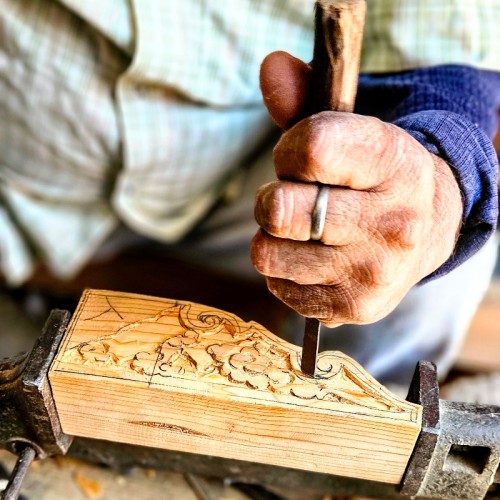
A Cultural Heritage Conservation Project Demonstrating an Alternative Tourism Development Model.
High in the dramatic landscapes of the Indian Himalayas, nestled in the remote Spiti Valley of Himachal Pradesh, lies the small village of Kwang—a place where time seems to slow and tradition still quietly shapes daily life. Here, we are engaged in an ongoing heritage reconstruction project, working with a select group of highly experienced Master Craftsmen and women to preserve and revive a centuries-old way of building that is uniquely adapted to the high-altitude desert environment.
The project is focused on restoring traditional homes using age-old techniques and natural materials such as mud, stone, lime and timber. These methods, passed down through generations, have long allowed Spitian communities to live in harmony with their harsh and fragile landscape. Rather than replacing these structures with concrete, we aim to support the continuity of vernacular architecture that is not only sustainable and resilient but also deeply embedded in the cultural and spiritual fabric of the region.
The work is about much more than just rebuilding walls, it is about rekindling pride in local knowledge systems. Master craftsmen, local youth, and skilled volunteers from across India and beyond come together on-site—learning by doing, sharing meals, and living simply amid the mountains. It is a slow, mindful process that invites deep connection: with the land, with each other, and with the stories held within these ancient walls. In Kwang, we are not just restoring buildings—we are helping a community hold on to its sense of place, history, and identity in a rapidly changing world.
Be the Change
At the heart of the Kwang Project is a deep personal commitment to be the change we wish to see in the world. Kimberley, the founder of Indi Architecture, is a full-time traveller who has chosen to root herself in the high Himalayas, living alongside the people of Spiti and learning from their quiet resilience and wisdom. Her life’s journey—spanning decades of travel through traditional cultures—has been both enriching and, at times, deeply disheartening. Again and again, she witnessed the loss of architectural heritage, as communities, in a bid to appear modern and prosperous, replaced their beautiful, time-tested homes with concrete boxes—turning their backs on the vernacular knowledge shaped lovingly by generations. The Kwang Project is Kimberley’s response: a living example of another path forward. It is a model that honours beauty, climate sensitivity, and cultural continuity—offering a vision of development that builds upon, rather than erases, the inherited wisdom of place.
Once Upon A Time....
The name of this tourism property - Once Upon a Time is both a tribute and an invitation—a call to remember a time when the people of this remote Himalayan region built beautiful, hand-crafted homes using wisdom passed down through generations. In these structures, function and form were never separate; local materials were transformed with care and skill into culturally resonant, climate-responsive homes that sat in harmony with their surroundings. Our property carries forward this legacy. When guests stay with us, they are not just visitors—they become part of a living story. They experience their own "Once upon a time"—a time when they journeyed to Spiti, stayed in an earthen home lovingly restored, and discovered the quiet luxury and comfort of a space built from the land, with heart, intention, and respect for place.